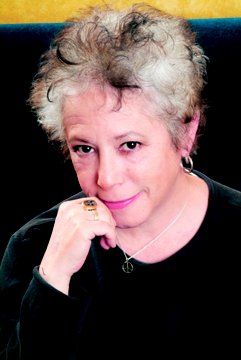Excerpts from the interview:
“I think of science fiction as the prose equivalent of jazz: they're both outsider forms, they both stand on the legacy of that which went before, and they both tend to cultivate an audience that is much more knowledgeable about the form than the regular pop or folk audience has to be. Even the most esoteric folk song can pretty much be enjoyed just for its melody and its beat, and the same for rock, whereas with science fiction the more you know the more you enjoy what you're reading. That creates a subculture, and that's both bad and good. It can become an ingrown-toenail subculture, so insular it can be isolating. (William Chow, or Chao Shao-lin, was telling me about the Peking Opera, and he said it reached a point where it became so codified that it was static, no longer art but a representation of what it once was, and you had to be educated in it before you could even enjoy it.) On the other hand, you have the freedom to create without the other pressures. Music is an outsider art that has spawned its own outsider culture, much as science fiction has, with its own social distinctions, language, way of dressing -- its own little conventions and rules.”
*
“It's pretty interesting to come to science fiction as a fan who is also a professional in an adjacent field, and who mainly knows the professionals in this field, rather than coming in through fandom. I think I kind of entered ass-backwards. I didn't have any choice!
“First I met Orson Scott Card. I had written to him in 1992, when I did an album called Breaking Silence. I was just passionate about his work and passionate about the anthology he did with the Connie Willis story 'All My Darling Daughters' (which had a huge impact on me). I wrote to thank him and got back this diatribe about the piece, and also a large amount of generous compliment for my own work. We met a few times and got on, and he started recommending some writers, which was great.
“Then, when I cut another album (God and the FBI, I think it was), I wrote to Mike Resnick and Anne McCaffrey, because each of them in their own way had influenced that album and I could point directly to those songs, and I thanked them. I got back a great e-mail from Annie that said, 'Well, I'm not sure who you are, but I will ask my children, and thank you in the meantime.' And Mike's e-mail said, 'Hey, that's great! I'm sure you're wonderful but I don't listen to anything but show music.' When I was in Ireland, I wound up going to visit with Anne, meeting some of her family and spending some time at Dragonhold. And Mike and Anne convinced me to go to my first worldcon (the one in Philadelphia), Anne on the theory that everyone should go to a worldcon and Mike on the theory that I should come and worship at his feet!”
*
 “A lot of the writers who contributed to Stars are my heroes, and that sort of overrode everything at the beginning. But I got really interested in who chose what and why, things like Joe Haldeman or Harry Turtledove picking one line of a song and running with that. A lot of it was so out-of-context, I had a hard time seeing what it had to do with the song. Then I relaxed and thought, 'I don't care. A good story is a good story.' And the goal of this book, to me, was to have some good stories by people I admired. The lyric tie-in was as much a convenience as anything else. And there was the fun of just being able to write to whoever I wanted and say, 'Hey, do you want to be in my book?' That was pretty cool. The two best things were that I got to read the stories first, and so many of the people already knew my work. When I asked Howard Waldrop if I should send him some CDs, he said, 'Nah, I've got everything.' I mean, 'The Ugly Chickens' is a seminal story that I've probably read 50 times!”
“A lot of the writers who contributed to Stars are my heroes, and that sort of overrode everything at the beginning. But I got really interested in who chose what and why, things like Joe Haldeman or Harry Turtledove picking one line of a song and running with that. A lot of it was so out-of-context, I had a hard time seeing what it had to do with the song. Then I relaxed and thought, 'I don't care. A good story is a good story.' And the goal of this book, to me, was to have some good stories by people I admired. The lyric tie-in was as much a convenience as anything else. And there was the fun of just being able to write to whoever I wanted and say, 'Hey, do you want to be in my book?' That was pretty cool. The two best things were that I got to read the stories first, and so many of the people already knew my work. When I asked Howard Waldrop if I should send him some CDs, he said, 'Nah, I've got everything.' I mean, 'The Ugly Chickens' is a seminal story that I've probably read 50 times!”
*
“The single thing all the forms have in common is the marriage of talent and craft. If you just have sheer talent but not the craft, it's not going to sustain you, and if you only have the craft it's not going to work because there will never be that incandescent moment that happens with a great writer. Great writers reach that incandescence and just immolate, in your mind and in your heart.”


